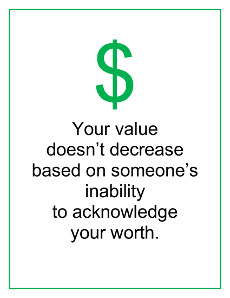 To a job seeker, “overqualified” means bargain. Look what you’re getting: All of this experience, skills, and maturity. And on the cheap!
To a job seeker, “overqualified” means bargain. Look what you’re getting: All of this experience, skills, and maturity. And on the cheap!
To a hiring manager, particularly one that leans toward tradition and conventional wisdom, “overqualified” means you are a liability because:
- You will leave as soon as you find work you are “qualified” for.
- You may become bored or despondent doing work that is “beneath” you.
- You will be expensive because your higher qualifications come with a bigger price tag.
- You’ve been in charge, and you won’t want to work for someone else.
- As a result, your manager (who may be younger or less experienced) may feel intimidated and not want to work with you.
- You are “old” and won’t be up to speed on the technology or have the energy to do the job.
These conclusions don’t fly out of the blue. They are based on decades of experience with candidates just like you. That means you must persuade the hiring authorities that you are the exception to the rule.
Determine your worth to each company
It is tempting to skip this step and just apply for jobs. That seems so much simpler. Read why clicking the apply button doesn’t work well for anyone and especially for candidates who are already struggling with a bias.
Instead, before you tailor your resume, write your cover letter, or talk to a recruiter, you must determine your value for each company. Write the answers to these questions and spend some time living with them before you move ahead:
- Research the company. Decide if this is a company you want to work for. For example, if the company has many ways of keeping out candidates that are too old, too experienced, too fat, or too expensive, is this a company that shares your values? Is it a company that will appreciate you? Is it a company you want to work for?
- Research the requirements of the job.
- What do you bring to the table that fulfills those requirements?
- If you have additional skills or experience, how will they help the company with its mission?
- Can you quantify your value to this company?
- What makes you a particularly good fit for the company?
- What makes you a particularly good fit for this role?
- What do you bring to this job that other candidates probably will not?
- Why are you worth the salary you are asking?
- What is the rock-bottom salary you will accept?
- How will you demonstrate that you are willing to commit to this company and not leave as soon as another offer comes along?
- How will you show your willingness to work and be managed at this level?
- How will the hiring manager know you are willing to work for someone younger and / or less experienced?
- How will you demonstrate that you are current with your industry knowledge and technology?
- How will you explain your decision to move downward in your career?
When you have settled on your answers to these questions, you’re ready to rewrite your career documents and prepare for your interviews.
If you are hearing “overqualified” a lot in your job search, contact me to talk about strategies we might use to get your career back on track.
Related
Overqualified: Why apply if you’re overqualified?
Overqualified: Strategies for your career documents and interview








